| Srl | Item |
| 1 |
ID:
116177
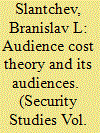

|
|
|
| 2 |
ID:
116178
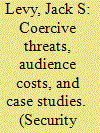

|
|
|
| 3 |
ID:
116182
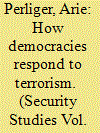

|
|
|
|
|
| Publication |
2012.
|
| Summary/Abstract |
While the academic study of counterterrorism has gained momentum in recent years, it still suffers from major theoretical weaknesses. One of the most prominent shortcomings is an absence of theories that can effectively explain the factors that shape the counterterrorism policies of democratic regimes. The present study attempts to fill this theoretical void in two ways. First, it proposes an analytical framework for a classification of counterterrorism policies. Second, it presents a theoretical framework that strives to uncover the factors that have influenced the struggle against domestic terrorism in democratic regimes. The analyses, which have used a unique and comprehensive dataset that documents counterterrorism policies in eighty-three democracies, show that the robustness of the regime's democratic foundations as well as the symbolic effect of terrorism are major forces in shaping the democratic response to it, while the direct impact of terrorism is less influential than assumed in the literature.
|
|
|
|
|
|
|
|
|
|
|
|
|
|
|
|
| 4 |
ID:
116180


|
|
|
|
|
| Publication |
2012.
|
| Summary/Abstract |
Numerous analysts have criticized George W. Bush's Middle Eastern policies for their strong ideological content. This article agrees with a core premise of these critiques, but it does so for very different reasons from most analyses. Ideological rigidity on some issues, paradoxically, prevented the Bush administration from taking advantage of the full range of ways in which ideologies shape international relations. There were three major opportunities to advance US interests in the Middle East during Bush's presidency that were created by the effects of ideologies. First, liberalizing parties in otherwise illiberal regimes tended to be significantly more supportive of US interests than other ideological groups in the same country at the same time. Second, major ideological differences among different types of illiberal enemies of the United States enhanced America's ability to adopt "wedge" strategies toward various hostile coalitions. Finally, the existence of different types of ideological enemies in the Middle East created incentives for some illiberals to align with the United States because of mutual ideological enmity for a third ideological group. The Bush administration, however, failed at key times to take advantage of these openings. If Bush administration officials had been less ideologically dogmatic while, somewhat paradoxically, making better strategic use of ideologies' major international effects, America's security would have been significantly advanced in critical cases.
|
|
|
|
|
|
|
|
|
|
|
|
|
|
|
|
| 5 |
ID:
116181


|
|
|
|
|
| Publication |
2012.
|
| Summary/Abstract |
According to John Mearsheimer, the United States entered the First World War because the Wilson administration believed the Triple Entente was on the verge of defeat. As a result, he claims, the Americans entered the war to prevent Germany from becoming a regional hegemon in Europe. A careful and targeted examination of the relevant primary sources, however, demonstrates that Washington was largely unaware of the plight of the Allied powers in the spring of 1917; therefore, the argument that the United States was acting as an offshore balancer at this time is unconvincing. This article shows that unit-level factors and statecraft can play a larger role in international relations than structural realist theory allows and makes an empirical contribution to the World War I literature by demonstrating that balance of power considerations were not a major factor in the Wilson administration's decision for war.
|
|
|
|
|
|
|
|
|
|
|
|
|
|
|
|
| 6 |
ID:
116179
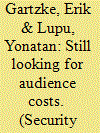

|
|
|
| 7 |
ID:
116176
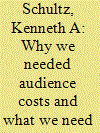

|
|
|